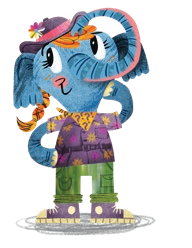Leviticus
1:1
The Israelites brought animals and grain to sacrifice as offerings to the Lord. Thinky knows that we don’t offer animals or grain as a sacrifice to God anymore. We don’t have to do that. That’s because Jesus died for us and became the perfect sacrifice for us. All we have to do is believe in Jesus.
But the Lord still wants us to live holy lives. And so we offer our lives to him when we obey his commands.
1–5
Each offering was brought in a special way. Read about it in 1:1–9. Burnt offerings were for asking forgiveness for sins. Every day, the priests brought burnt offerings for the people.
The animal that was sacrificed had to be perfect. They only used the best and most perfect animals they could find. The animal had to be killed, cut and burnt in a special way.
The Israelites brought five kinds of offerings. They thanked, praised and worshipped the Lord with grain offerings and friendship offerings. Burnt offerings, sin offerings and guilt offerings were brought to ask forgiveness for their sins.
3:6
The Israelites brought a friendship offering to thank God for caring for them. They also brought it to make their relationship with God stronger. They did this especially after he had helped them. Only part of this offering was burnt. The priest sprinkled the animal’s blood over the sides of the altar. Then he burnt the fat, the kidneys and part of the liver. The rest was given back to the person who’d brought the sacrifice. The family that brought the offering then shared the part returned. They would eat it with the priest, their own families or give it to the poor.
6:1–7
People often treat one another badly. God wants us to make things right when we do that. Inny wants you to think about your life. Make a list of people you have treated badly this past week or two. Maybe you were unfriendly or selfish or mean. Write guilt offering next to their names. Then write what you are going to do to make it right with that person. That is how you repair your relationship with that person.
7:7
The people brought sin offerings. They did this to ask forgiveness for things they had done wrong without meaning to.
The people brought guilt offerings when they had done something wrong to someone. Their offering showed that they wanted to make things right again. The fat, the kidneys and part of the liver of the animal were burnt on the altar. The rest of the meat was given to the priest.
8:10–12, 30
Moses had to pour oil on the holy tent and everything in it. He also poured oil on Aaron and his sons and their clothes. Moses did this to set apart the holy tent and the people who would serve the Lord.
Leviticus anointed to serve the Lord in the holy tent. But they didn’t respect God and didn’t follow his rules for the offerings. Instead they brought their offerings in the way they wanted to. They forgot that the Lord is holy and that they had to respect him.
10:10
We read a lot about things being clean or unclean in Leviticus. If something was clean, it could be used in the holy tent. If a person was clean, they were allowed to worship God in the holy tent. Some animals, such as pigs, were always unclean. There were also several things that could make a person unclean. These were having a skin disease, touching dead bodies or going to unclean places. The unclean person then had to follow certain rules to become clean again.
13:9, 45–46
People with skin diseases had to go to the priest to be examined. If he saw open sores, the person was unclean. The person had to stay away from everyone so that others wouldn’t get the disease. Read verses 45–46. The worst skin disease was leprosy. People with leprosy had to live far away from other people because it spreads easily. There was no cure for this disease in those days. Today people with leprosy can be cured.
16:20–34
The day that sin was paid for was called the Day of Atonement. It was an important and holy day that happened once a year. On this day, the high priest went into the Most Holy Place. There he made offerings for his sins, his family’s sins and the people’s sins. He also made offerings for the sins the people didn’t know they had committed. The people had to confess their sins to the Lord.
To atone means to make up for doing something wrong. When the people sinned, they broke their relationship with the Lord. The high priest made this sin offering so that the relationship could be right again.
16:20–22
On the Day of Atonement, the priest brought two goats to the Lord. The first goat was sacrificed for the people’s sins. The second goat was used to carry away the sins of the people. The high priest would place his hands on the head of the second goat. He confessed the sins of the people over it. Then he sent the goat into the desert. It was as if the peoples’ sins had been placed on the goat’s head. The goat disappeared into the desert carrying away the sins of the people. In this way, the Lord showed his people that their sins were forgiven.
17:10–14
The Israelites weren’t allowed to eat or drink blood. They believed that blood represented life. Blood was life and without it there was no life. The blood of the animals they sacrificed washed away their sins. The animal gave its life or its blood in their place. This was done so that their sins could be forgiven.
23
The Israelites celebrated seven feasts every year.
- The Sabbath. This was once a week.
- The Passover and the Feast of Unleavened Bread. This was in the spring.
- The Feast of First Fruits. This was after Passover.
- The Feast of Weeks. This was at the end of the harvest.
- The Feast of Trumpets. This was three days before the Day of Atonement.
- The Day of Atonement. This was the day when sin was paid for.
- The Feast of Booths. This was in September or October.
23:1
The people gathered on feast days. They listened as the Levites told them everything that God had done for them. They were glad and grateful because he cared for them and protected them. They honoured the Lord and promised to serve him.
The feast days weren’t holidays, but holy days that belonged to God. On the feast days, the people worshipped the Lord.
25:8–10 (Hearty)
Hearty wonders how you would feel if you owed money that you couldn’t pay back. Draw your face showing how you feel. Look at Hearty’s color chart on page 19. Color the face with the color of your feelings.
How would you feel if you suddenly heard that your debt had been completely paid? Draw your face showing your feelings. Check the color chart and color this face with the color of your feelings.
25:8–13
Every fiftieth year was the Year of Jubilee for the Israelites. All debts were cancelled. Land was returned to its original owner. The Lord wanted to remind the Israelites of these important things. The land belonged to him. He allowed them to use it out of his kindness. God also wanted them to help people who were suffering. He never wanted them to treat other people badly.
26:3–13
God asked the Israelites to serve him and obey his commandments. If they did that, he promised to protect them. Get your group together. Talky would like you to talk about the wonderful promise in verse 12. Also talk about what God expected the Israelites to do. See verse 3. Then write your promise to the Lord.
Begin like this:
Lord, you are with us. That’s why we __________
Talk about different ways to be God’s people. What must you do? How must you live?
27:1–4
A man was set free for 20 ounces of silver. A woman was set free for only 12 ounces of silver. Why was there a difference between the two? In those times, men were able to earn money, but women had to stay home. They couldn’t earn money.
Today men and women are equal. It doesn’t matter if they earn money or not. Jesus died on the cross for both men and women. In him, a man and a woman are equally important.
27:3
The book of Leviticus is full of the laws that God gave to the Israelites. We may think that it’s out of date for us today. But God’s commands for his people don’t change. God still wants us to learn about being honest in all we do. He wants us to be caring and generous toward others, especially poor people. He wants us to be serious about turning away from the wrong things we do. We must remember that God is holy and just. And we must remember that God wants us to live good and holy lives.





